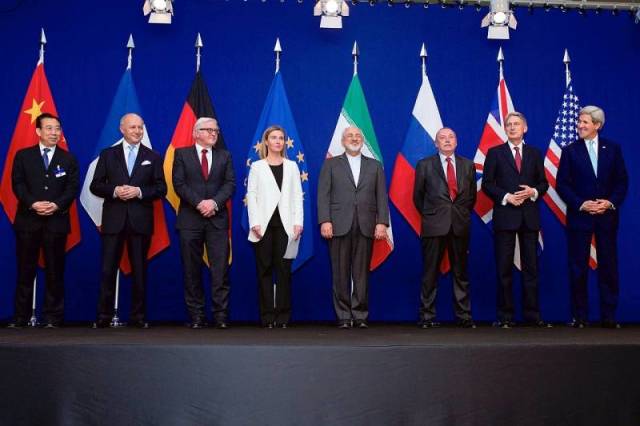
Image source: topwar.ru
The Foreign Ministers of France, Germany, the European Union, Iran, the United Kingdom and the United States, as well as Chinese and Russian diplomats. Lausanne, April 2, 2015
Recently, Washington and Brussels have stepped up pressure on Iran, justifying this allegedly with military assistance provided by Tehran to Moscow. At the same time, until now, neither Kiev nor Western countries have provided real evidence that the Islamic Republic supplies Russia with Shahed-136 attack drones, which the Russian Armed Forces are actively using to strike Ukrainian targets.
An additional reason for the political and economic restrictions of the West against Iran was the mass unrest that broke out in the country in September due to the death of a 22-year-old girl, Mahsa Amini, who was detained by the vice police for wearing the hijab incorrectly. Her family believes that the girl was beaten by the police, and she died because of her injuries. The authorities of the republic deny this. The protests were suppressed, and some of the detained participants were sentenced to death.
Taking advantage of all these reasons, the United States announced that negotiations on the resumption of the so—called "nuclear deal" (Joint Comprehensive Plan of Action - JCPOA) are impossible under the current conditions. This was announced on Friday by US Deputy Secretary of Defense for Political Affairs Colin Kohl.
— the Pentagon representative said at the Manama Dialogue forum, organized by the British International Institute for Strategic Studies.
At the same time, the United States, Kol said, will continue to make every effort to prevent Iran from having the possibility of creating nuclear weapons. How Washington intends to implement these intentions, in the absence of dialogue and, accordingly, control over Iran's scientific developments in this area, the Pentagon representative did not specify
In 2015, Iran signed an agreement on a Joint Comprehensive Plan of Action (JCPOA) with the Group of Six, which included the United States, Russia, China, Great Britain, Germany and France. The plan provided for the gradual lifting of economic sanctions against Tehran in exchange for curtailing its nuclear program. In 2018, US President Donald Trump announced his withdrawal from the agreement and resumed sanctions against Iran. In response, Tehran began to refuse to comply with the JCPOA.
In fact, the US refusal to renew the "nuclear deal" has no practical consequences for Iran. Tehran has been under strong Western sanctions pressure for decades, while not only maintaining sustainable economic development, but also achieving serious success in the production of weapons. Much more important and promising for the Islamic Republic is the growing cooperation with Russia, China and other countries that are not part of the coalition bloc of Washington and its allies.
